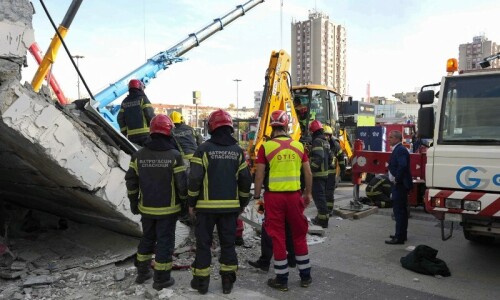The carbon cost of technology
The environmental impact of information technology is often overlooked, even though data centres and transmission networks account for 1pc to 1.5pc of global electricity use. They also account for 0.6pc of global carbon emissions, which need to be cut in half to achieve a net-zero emissions scenario by 2050, according to the International Energy Agency. A single average data centre consumes the equivalent of heating 50,000 homes yearly. Electronic waste is the fastest-growing waste stream in the world, amounting to a staggering 57m tonnes generated each year, about the same weight as the Great Wall of China. Large language models require tens of thousands of cutting-edge high-performance chips for training and for responding to queries, leading to high energy consumption and carbon emissions. The data sets required to train and run AI models are large and complex, leading to high energy consumption and carbon emissions. The production and disposal of AI hardware contribute to carbon emissions and the growing e-waste problem.
(Adapted from “Tackling AI’s Climate Change Problem,” by Niklas Sundberg, published on December 12, 2023, by MIT Sloan Management Review)
Post-pandemic obesity
From rising obesity rates to increasing diabetes diagnoses, physical health in the United States is plummeting. Key physical health metrics have notably worsened since before the pandemic, including obesity, diabetes and eating habits. Since Gallup began ongoing measurement in 2008, obesity rates in the US have climbed steadily, increasing about 13 percentage points to the current level of 38.4pc. This increase translates to an estimated 33m more US adults who are obese today than would have been the case if the rate had held steady at the 2008 level. Much of the recent increase in obesity may be associated with modified health behaviours resulting from the pandemic. While exercise rates have managed to remain intact, eating habits nationally have eroded substantially since 2019. After controlling for factors such as age, income and education, workers with poor physical health — and poor wellbeing generally — suffer greatly enhanced levels of unplanned absenteeism than do their counterparts.
(Adapted from “In US, Physical Health Plummets After The Pandemic,” by Dan Witters, published on December 14, 2023, by Gallup)
Minimising vacation stress
How often do you end up feeling even more stressed by taking time off from work? For many of us, taking vacation actually means cramming in extra work up until the moment we leave — and making up for lost time once we return. But there are ways to lay the groundwork for a restful vacation. Here’s how: 1) A few weeks before your vacation, make a list of the tasks that absolutely must be done before you go. 2) Make sure your boss, colleagues, and clients know the dates you’ll be gone. This helps put the onus on them to bring you anything essential before you go. 3) Figure out who can best handle each part of your job while you’re away, and ask that person if they can cover for you. 4) Customise your out-of-office message so that there will be less work for you to return to.
(Adapted from “How To Minimise Stress Before, During, and After Your Vacation” by Tristan Elizabeth Gribbin, published by HBR Ascend)
India’s metro lines
When Narendra Modi became India’s prime minister in 2014, the country’s entire metro-rail network spanned 229km (142 miles) in four-and-a-half cities: Bangalore, Delhi, Gurgaon (a satellite of Delhi), Kolkata and Mumbai. That amounted to less than half the length of Shanghai’s metro at the time. Yet Mr Modi’s government has since presided over a massive metro-rail expansion. By last April, India’s network covered 870km in 18 cities. Another 1,000km or so of metro track is under construction in 27 cities. Just under 6km of new track is being commissioned every month. Navi Mumbai, a satellite of Mumbai, became the latest city to boast a metro when its first line opened in November. Yet although the speed and scale of India’s metro build-out over the past decade have been impressive, the associated passenger figures are dismal, with Costly fares, inconvenience and poor planning all playing a role.
(Adapted from “Why are Indians shunning the country’s shiny new metro lines?” published on December 20, 2023, by The Economist)
Published in Dawn, The Business and Finance Weekly, December 25th, 2023















































Dear visitor, the comments section is undergoing an overhaul and will return soon.